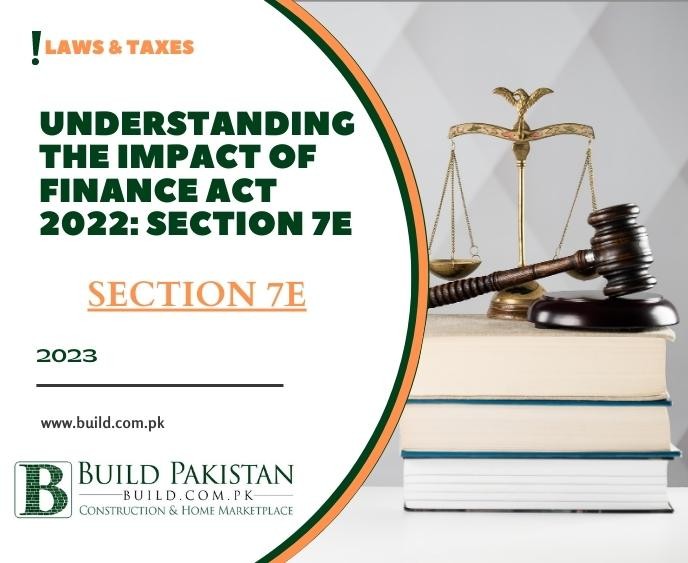Understanding the Impact of Finance Act 2022: Section 7E

INTRODUCTION:
The Finance Act of 2022 introduced Section 7E of the Income
Tax Ordinance, 2001 ("ITO"), which provides that movable properties
owned by residents with a fair market value of more than PKR 25 million are
subject to a 20% tax on the first 5% of that value, with some exceptions. This
requirement was made applicable both retroactively and prospectively, or
starting with the tax year 2022.
The majority of taxpayers had, however, disputed this clause,
and several lawsuits had been submitted from all throughout the nation to the
relevant province High Courts. The Sindh High Court's ("SHC") Order
was upheld by the Supreme Court of Pakistan, which also issued a stay order in
the appellants' favor, subject to the deposit of 50% of the tax demand. The
appellant taxpayers were given permission to appeal the SHC Order.
As of right now, no movable property may be sold or
transferred without providing proof to the transferring authority that the
seller or transferer had properly paid the deemed income tax liability on the
subject property. This requirement was added by the Finance Act 2023 (also
known as "Act 23"). However, the Act 23 did not provide any
guidelines or payment methods for the purposes of Section 236C(2A). The FBR
published the following instructions about the form and manner of payment on
July 21, 2023, in Circular No. 01 of 2023-24:
DIRECTIONS WHERE THE NAME OF THE SELLER OR TRANSFEROR APPEARS IN THE ATL:
A. In cases where the transferor or seller has not released:
If a person's deemed income tax liability is greater than the
amount reported on their TY 2022 income tax return, they must pay the
difference separately through the FBR's online payment system and present a
Computerized Payment Receipt ("CPR") to the transferring authority.
This will satisfy the requirements of the aforementioned Amendment.
THE FOLLOWING INSTRUCTIONS APPLY WHERE THE SELLER OR TRANSFEROR'S NAME APPEARS IN THE ATL AND HE/SHE HAS DECLARED THE SAID PROPERTY IN HIS SECTION 7E DECLARATION FILED ALONG WITH HIS TY 2022 INCOME TAX RETURN OR IS NOT REQUIRED TO PAY DUE TO STAY FROM ANY COURT OF LAW/AUTH:
A. When the transferor or seller has a Stay in place
Such a person shall be required to complete Form A, which is
affixed to the issued Circular, and submit it to the relevant Commissioner,
Inland Revenue, if he has obtained an order from any court or has declared the
immovable property in his Section 7E declaration. After receiving the aforementioned
Form A and reviewing the information that the taxpayer provided on it, the
Commissioner must issue a certificate within seven days of receiving the
completed Form A. For the purposes of Section 236C(2A), this certificate shall
be adequate documentation.
However, there is no information or declaration on the Form A
that the seller must fill out on any ongoing legal actions involving Section 7E
for the taxpayer. The instructions only reference declaring property under
Section 7E for Tax Year 2022, therefore it's unclear what the procedure would
be for immovable assets purchased during Tax Year 2023.
Furthermore, it appears to be a redundant exercise if the
intent of this Form A is to record the specifics of immovable property and the
justification for exclusion from Section 7E, as such information is already
included in the declaration for Section 7E under IRIS.
DIRECTIONS WHERE THE NAME OF THE SELLER OR TRANSFEROR APPEARS IN THE ATL BUT THEY ARE JOINT OWNERS:
A. When there are many owners of the property
If more than one person, then each person must pay down their
individual deemed income tax debt using the appropriate methods described in
paragraphs A and B.
DIRECTIONS WHERE THE NAME OF THE SELLER OR TRANSFEROR DOES
NOT APPEAR IN THE ATL:
A. In cases where the person's name is omitted from the
second payment challan from the FBR's online payment system
must be used to make the required payment in order to satisfy the modification
provision of the contract.

WAY FORWARD
For individuals who have reported property under Section 7E
on IRIS, an option in the online declaration under IRIS should be introduced to
upload a certified copy of the Stay Order for the relevant tax year. This is
because the top court has given a stay order subject to payment of 50% tax
demand under Section 7E. With the FBR, a computerized database of taxpayers who
currently have an active Stay order will be created. Additionally, IRIS should
be used for the certificate application procedure. Once more, this will produce
a digital record of the papers. Additionally, this might guarantee that the
properties exempt from taxation under Section 7E and the impact of the stay
order are included in the tax particulars online, which can then be shared with
the person in charge of registering the immovable property by the FBR to help
him ensure compliance with Section 236C(2A) in a more effective way.
DISCLAIMER:
His publication is owned by Tola Associates and Tola &
Tola, and its contents cannot be used or duplicated for any reason without Tola
Associates and Tola & Tola's prior written consent.
Unless otherwise stated, the information in this publication
is based on the laws in effect as of the date and may not be exhaustive. The
contents may vary as a result of changes in tax regulations, which occur
sometimes.
It is impossible to say with confidence that the author's
views would be recognized or agreed upon by the tax authorities since the
author's comments in the publication are a question of interpreting the law and
are based on author's judgments and experience. Additionally, this publication
makes no financial or other guarantees. For whatever reason, Tola Associates
and Tola & Tola neither accept nor take on any liability.
To raise public understanding of taxes in the nation, this
magazine is distributed online free of charge to the general public.
Saturday, July 22, 2023









